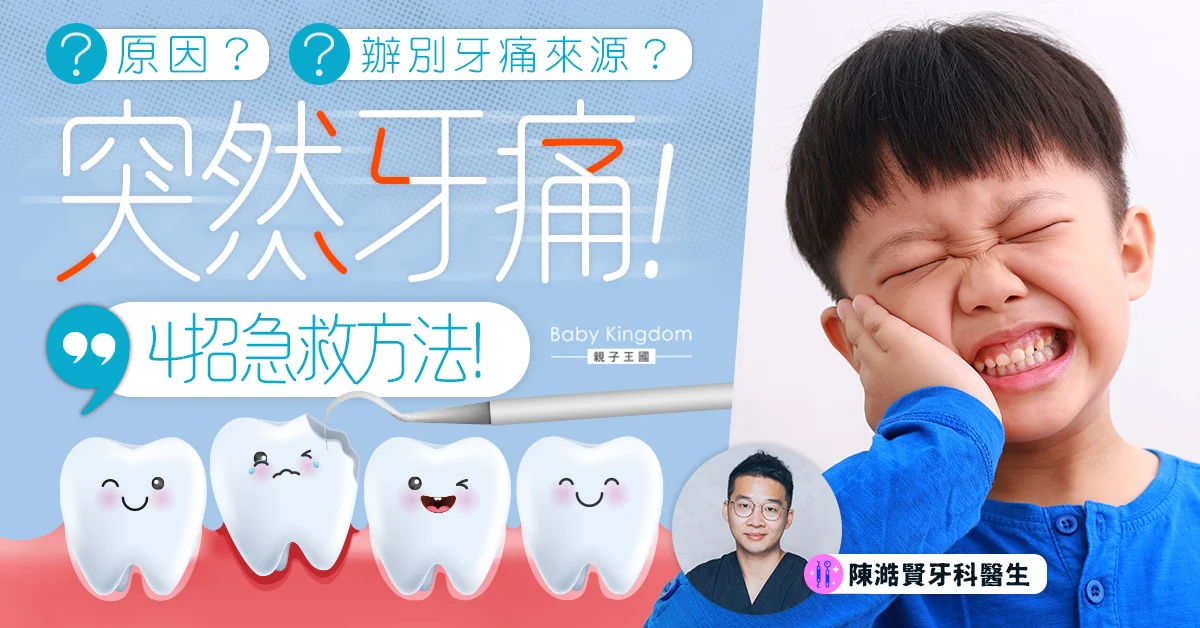[Dental Health] What to do when a toothache strikes suddenly? 4 tips to instantly relieve the pain!
Many people have likely experienced sudden toothache, sometimes so severe that it keeps them awake at night. When toothache strikes unexpectedly and cannot be treated, what methods can effectively and immediately relieve the pain? Here are four first-aid methods to help soothe and alleviate the suffering of toothache!
Why do teeth suddenly start to hurt?
(1) Tooth decay
Pain caused by cavities is mainly a sudden stinging or throbbing pain. If the cavity is severe, the dental pulp nerve may be exposed or infected, making the teeth more sensitive. Whenever you eat foods that are sweet, sour, cold, or hot, the dental pulp nerve may be stimulated, thus causing pain.
(2) Inflammation of wisdom teeth
If the back teeth are painful, it may be due to abnormal growth of the wisdom teeth, such as insufficient growth space, cavities, or gingivitis.
(3) Gingivitis
Inflamed and swollen gums can also cause toothache, and even trigeminal neuralgia and facial neuralgia. When plaque and tartar accumulate on teeth over a long period, the bacteria in them can invade the gum tissue, causing gingivitis. Gingivitis may develop into periodontal disease, leading to sudden toothache.
(4) Cracked teeth
Teeth can be damaged by external injury, long-term chewing of hard foods, severe teeth grinding, etc. When highly irritating foods or drinks are transmitted to nerves through the cracks in the teeth, it may cause toothache.
(5) Tooth sensitivity
When the outermost enamel of a tooth is worn away, the tooth loses its protective layer, exposing the dentin and causing the tooth to become sensitive. The nerve endings in the tiny tubules of the dentin are easily stimulated, causing the patient to feel stinging or soreness.
- How can you identify the cause of pain?
Before addressing or relieving toothache, patients can determine the source of the pain by considering the following questions:
(1) Occurs while chewing food?
If your teeth hurt when chewing food or biting, it may be due to cavities, broken teeth, or fillings.
(2) Is the pain intermittent?
In some patients, the pain occurs in paroxysms, each lasting from a few seconds to a few minutes. The pain is described as burning or cutting, and the patient is unable to accurately locate the affected tooth. In such cases, the toothache may be caused by pulpitis or trigeminal neuralgia.
(3) Is the pain persistent?
If you experience persistent tooth pain, it may be due to irritation of the dental nerve. For example, moderate or severe tooth decay can cause the decay to spread to the dentin or lead to persistent inflammation and swelling of the gums or gingiva, which can compress the nerve and cause persistent pain.
(4) Does the pain only occur after exposure to external stimuli?
If tooth pain only occurs when eating acidic, sweet, cold, or hot spicy foods and drinks, it may be due to tooth sensitivity.
How can you relieve a sudden toothache?
Toothache can have various causes. Before the exact cause is known or before a doctor's help can be sought, patients can try the following methods to relieve pain immediately:
(1) Apply ice
When experiencing toothache, patients can wrap ice cubes in a towel and apply it to the swollen area for 5 to 10 minutes, then rest for 10 minutes, repeating this 3 to 5 times. Cold compresses can help relieve pain caused by redness and swelling, but care should be taken not to let the ice cubes come into direct contact with the affected tooth or to apply the cold compress for too long.
(2) Rinse your mouth
Some toothaches are caused by bacterial inflammation, which can be treated by rinsing with warm salt water. Patients can add half a teaspoon of salt to a cup of warm water and use it to rinse their mouths, minimizing the number of bacteria and relieving inflammation.
(3) Remove foreign objects from the mouth or improve oral hygiene
Patients with cavities may experience pain due to food getting stuck in the affected area. They can use dental floss to remove food debris stuck in their teeth or use alcohol-free mouthwash to rinse their mouths, both of which can help relieve toothache.
(4) Taking painkillers
In addition to the methods mentioned above, patients can also take anti-inflammatory and analgesic medications to relieve pain. However, it is important to take the recommended dosage and avoid taking too much medication in an attempt to quickly relieve the pain.
The above methods can only temporarily relieve toothache. If the pain persists or lasts for a long time, patients should seek dentist examination and treatment as soon as possible to completely solve the problem and prevent the condition from worsening.
Author: Dr. Eric Chan















